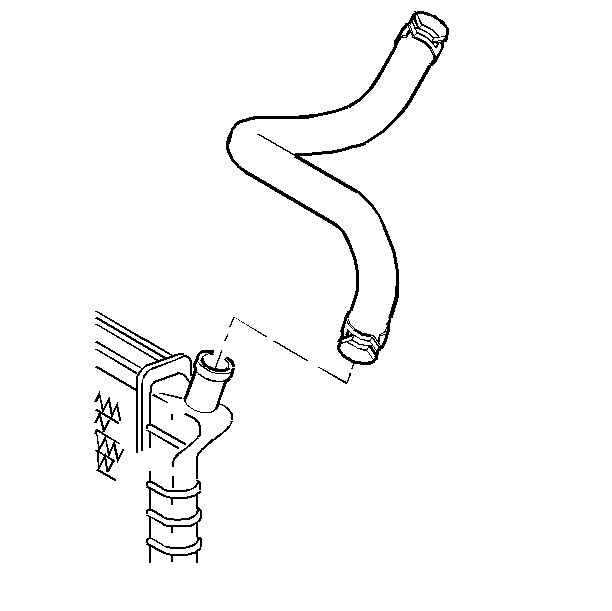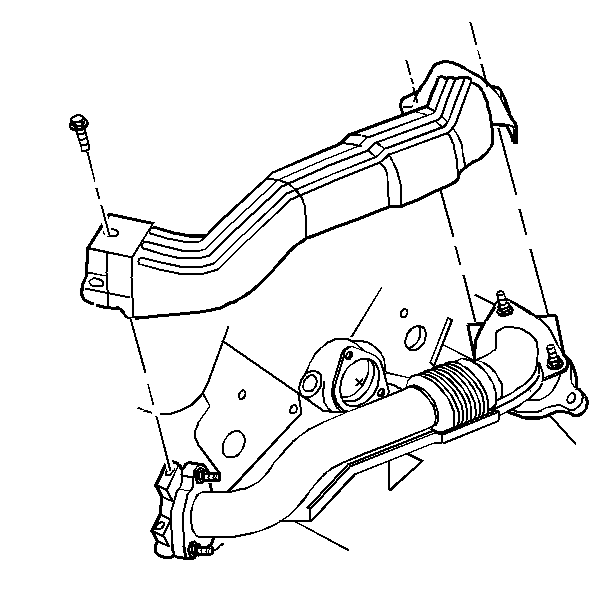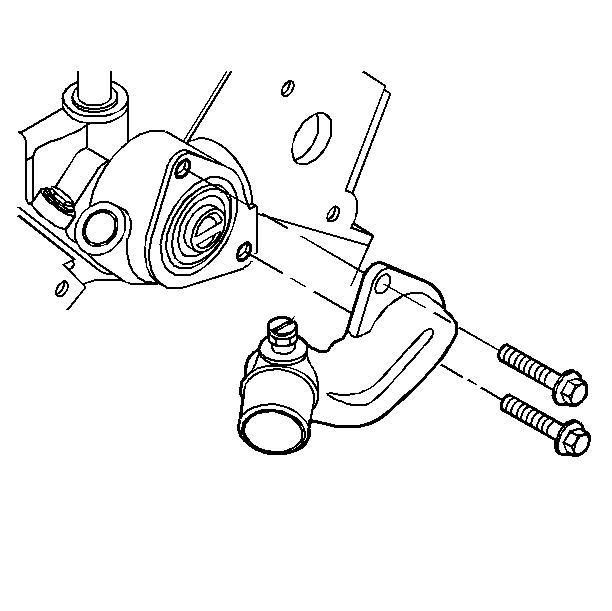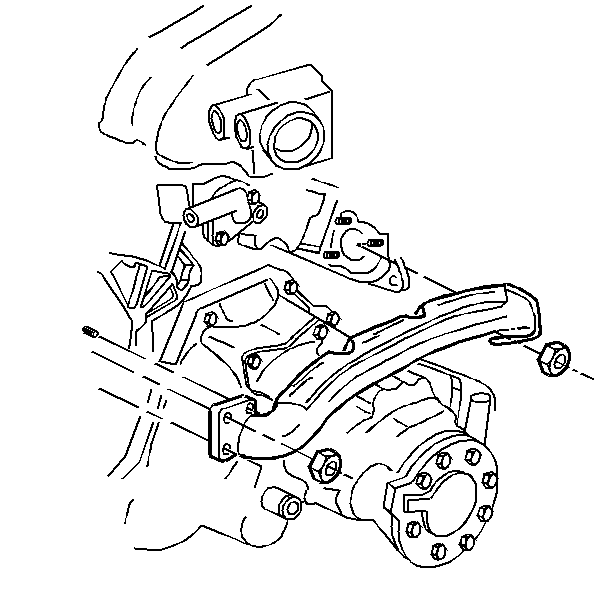Exhaust Crossover Pipe Replacement 3.1L Engine
Removal Procedure
- Remove the air cleaner and duct. Refer to Engine Controls.
- Drain the engine coolant. Refer to Cooling System Draining and Filling in Engine Cooling.
- Remove the engine torque struts. Refer to Engine Mount Strut Replacement in Engine Mechanical.
- Rotate the engine. Refer to Rotating the Engine for Service Access in Engine Mechanical.
- Remove the tie straps from the heater outlet pipe and ignition wiring harness.
- Remove the upper radiator hose from the engine.
- Remove the vacuum modulator pipe. Refer to Vacuum Modulator in Automatic Transaxle.
- Remove the heater outlet hose and thermostat bypass pipe. Refer to Heater Hoses in HVAC.
- Remove the heat shield bolts.
- Remove the heat shields.
- Remove the crossover pipe bolts.
- Remove the crossover pipe.


Installation Procedure
- Install the crossover pipe.
- Install the crossover bolts.
- Install the heat shields.
- Install the heat shield bolts.
- Install the heater outlet hose and the thermostat bypass pipe. Refer to Heater Hoses in HVAC.
- Install the vacuum modulator pipe. Refer to Vacuum Modulator in Automatic Transaxle.
- Install the tie straps at the heater outlet pipe and ignition wiring harness.
- Install the upper radiator hose to the engine.
- Rotate the engine. Refer to Rotating the Engine for Service Access in Engine Mechanical.
- Install the engine torque struts. Refer to Engine Mount Strut Replacement in Engine Mechanical.
- Refill with engine coolant. Add two engine coolant sealant pellets, GM P/N 3634621. Refer to Cooling System Draining and Filling in Engine Cooling.
- Bleed the engine coolant.
- Install the air cleaner and duct. Refer to Engine Controls.

Tighten
Tighten the bolts to 25 N·m (18 lb ft).
Notice: Use the correct fastener in the correct location. Replacement fasteners must be the correct part number for that application. Fasteners requiring replacement or fasteners requiring the use of thread locking compound or sealant are identified in the service procedure. Do not use paints, lubricants, or corrosion inhibitors on fasteners or fastener joint surfaces unless specified. These coatings affect fastener torque and joint clamping force and may damage the fastener. Use the correct tightening sequence and specifications when installing fasteners in order to avoid damage to parts and systems.
Tighten
Tighten the bolts to 10 N·m (89 lb in).


Exhaust Crossover Pipe Replacement 3.4L Engine
Removal Procedure
- Remove the air cleaner and duct. Refer to Engine Controls.
- Remove the mounting nuts.
- Remove the crossover pipe.

Installation Procedure
- Install the crossover pipe.
- Install the mounting nuts.
- Install the air cleaner and duct. Refer to Engine Controls.

Tighten
Tighten the nuts to 25 N·m (18 lb ft).
Notice: Use the correct fastener in the correct location. Replacement fasteners must be the correct part number for that application. Fasteners requiring replacement or fasteners requiring the use of thread locking compound or sealant are identified in the service procedure. Do not use paints, lubricants, or corrosion inhibitors on fasteners or fastener joint surfaces unless specified. These coatings affect fastener torque and joint clamping force and may damage the fastener. Use the correct tightening sequence and specifications when installing fasteners in order to avoid damage to parts and systems.
Exhaust Crossover Pipe Replacement 3.8L Engine
Removal Procedure
- Remove the engine cover.
- Remove the air cleaner and duct. Refer to Engine Controls.
- Remove the crossover pipe mounting bolts.
- Remove the crossover pipe and seal.

Installation Procedure
- Install the crossover pipe and seal.
- Install the crossover pipe and mounting nuts.
- Install the air cleaner and duct. Refer to Engine Controls.
- Install the engine cover.

Tighten
Tighten the nuts to 25 N·m (18 lb ft).
Notice: Use the correct fastener in the correct location. Replacement fasteners must be the correct part number for that application. Fasteners requiring replacement or fasteners requiring the use of thread locking compound or sealant are identified in the service procedure. Do not use paints, lubricants, or corrosion inhibitors on fasteners or fastener joint surfaces unless specified. These coatings affect fastener torque and joint clamping force and may damage the fastener. Use the correct tightening sequence and specifications when installing fasteners in order to avoid damage to parts and systems.
